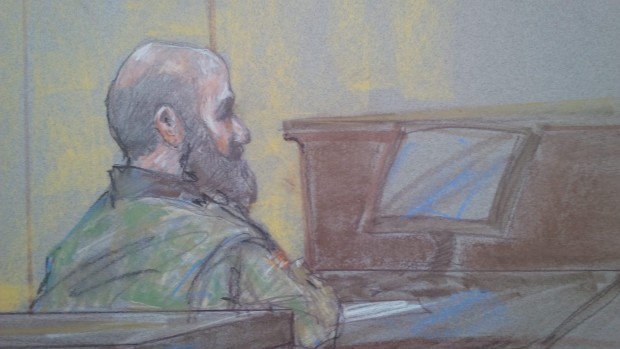
A courtroom sketch of Major Nidal Hasan as a military jury finds Hasan guilty of 13 counts of murder and 32 counts of attempted murder in the attack he committed on 05 November 2009 against fellow soldiers in Fort Hood, Texas, USA, 23 August 2013. (EPA/Brigitte Woosley)
Fort Hood, AP—A military jury sentenced Maj. Nidal Hasan to death for the 2009 shooting rampage at Fort Hood, delivering the only punishment the Army believed fit for an attack on fellow unarmed soldiers. The sentence was one that Hasan also appeared to seek in a self-proclaimed effort to become a martyr.
The rare military death sentence came nearly four years after the attack that stunned even an Army hardened by more than a decade of constant war. Hasan walked into a medical building where soldiers were getting medical checkups, shouted “Allahu akbar”—Arabic for “God is great!”—and opened fire with a laser-sighted handgun. Thirteen people were killed.
Hasan could become the first US soldier executed in more than half a century. But because the military justice system requires a lengthy appeals process, years or even decades could pass before he is put to death.
The US-born Muslim has said he acted to protect Islamic insurgents abroad from American aggression, and he never denied being the gunman.
He acknowledged to the jury that he pulled the trigger in a crowded waiting room where troops were getting final medical checkups before deploying to Iraq and Afghanistan. Thirteen people were killed and more than 30 wounded.
It was the worst ever attack on a US military base.
The same jurors who convicted Hasan last week deliberated the sentence for about two hours. They needed to agree unanimously on the death penalty. The only alternative was life in prison without parole.
The lead prosecutor assured jurors that Hasan would “never be a martyr” despite his attempt to tie the attack to religion.
“He is a criminal. He is a cold-blooded murderer,” Col. Mike Mulligan said Wednesday in his final plea for a rare military death sentence.
Hasan made no statement Wednesday before the sentence and had no visible reaction when it was read. Officials said he will be transported on the first available military flight to the military prison at Fort Leavenworth in Kansas.
For nearly four years, the federal government has sought to execute Hasan, believing that any sentence short of a lethal injection would deny justice to the families of the dead and the survivors.
Hasan has seemed content to go to the death chamber for his beliefs. He fired his own attorneys to represent himself and barely put up a defense during his trial.
He was never allowed to argue in front of the jury that the shooting was necessary to protect Islamic and Taliban leaders from US troops. During the trial, Hasan leaked documents to journalists that revealed him telling military mental health workers in 2010 that he could “still be a martyr” if executed.
All but one of the dead were soldiers, including a pregnant private who curled on the floor and pleaded for her baby’s life.
The attack ended only when Hasan was shot in the back by an officer responding to the shooting. Hasan is now paralyzed from the waist down.
Death sentences are rare in the military, which has just five other prisoners on death row. The cases trigger a long appeals process. And the president must give final authorization before any service member is executed. No US soldier has been executed since 1961.
